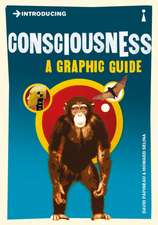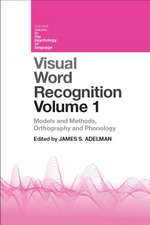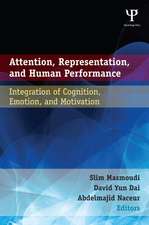Empirical Direction in Design and Analysis: Scientific Psychology Series
Autor Norman H. Andersonen Limba Engleză Paperback – iul 2001
*emphasis on visual inspection as a basic skill in experimental analysis to help students develop an intuitive appreciation of data patterns;
*exercises that emphasize development of conceptual and empirical application of methods of design and analysis and de-emphasize formulas and calculations; and
*heavier emphasis on confidence intervals than significance tests.
The book is intended for use in graduate-level experimental design/research methods or statistics courses in psychology, education, and other applied social sciences, as well as a professional resource for active researchers. The first 12 chapters present the core concepts graduate students must understand. The next nine chapters serve as a reference handbook by focusing on specialized topics with a minimum of technicalities.
| Toate formatele și edițiile | Preț | Express |
|---|---|---|
| Paperback (1) | 440.77 lei 6-8 săpt. | |
| Taylor & Francis – iul 2001 | 440.77 lei 6-8 săpt. | |
| Hardback (1) | 1030.26 lei 6-8 săpt. | |
| Taylor & Francis – iul 2001 | 1030.26 lei 6-8 săpt. |
Din seria Scientific Psychology Series
- 19%
 Preț: 426.84 lei
Preț: 426.84 lei -
 Preț: 314.77 lei
Preț: 314.77 lei -
 Preț: 110.22 lei
Preț: 110.22 lei -
 Preț: 478.71 lei
Preț: 478.71 lei - 25%
 Preț: 501.45 lei
Preț: 501.45 lei -
 Preț: 499.50 lei
Preț: 499.50 lei - 23%
 Preț: 320.36 lei
Preț: 320.36 lei -
 Preț: 493.73 lei
Preț: 493.73 lei -
 Preț: 489.87 lei
Preț: 489.87 lei -
 Preț: 491.17 lei
Preț: 491.17 lei -
 Preț: 492.20 lei
Preț: 492.20 lei -
 Preț: 482.53 lei
Preț: 482.53 lei -
 Preț: 228.77 lei
Preț: 228.77 lei - 26%
 Preț: 821.13 lei
Preț: 821.13 lei -
 Preț: 436.14 lei
Preț: 436.14 lei -
 Preț: 449.41 lei
Preț: 449.41 lei - 12%
 Preț: 325.34 lei
Preț: 325.34 lei - 12%
 Preț: 325.34 lei
Preț: 325.34 lei -
 Preț: 310.65 lei
Preț: 310.65 lei -
 Preț: 388.64 lei
Preț: 388.64 lei - 18%
 Preț: 788.94 lei
Preț: 788.94 lei -
 Preț: 127.59 lei
Preț: 127.59 lei - 26%
 Preț: 848.54 lei
Preț: 848.54 lei
Preț: 440.77 lei
Nou
Puncte Express: 661
Preț estimativ în valută:
84.34€ • 87.01$ • 70.38£
84.34€ • 87.01$ • 70.38£
Carte tipărită la comandă
Livrare economică 26 martie-09 aprilie
Preluare comenzi: 021 569.72.76
Specificații
ISBN-13: 9780805840834
ISBN-10: 0805840834
Pagini: 96
Dimensiuni: 178 x 254 x 5 mm
Greutate: 0.25 kg
Ediția:1
Editura: Taylor & Francis
Colecția Psychology Press
Seria Scientific Psychology Series
Locul publicării:Oxford, United Kingdom
ISBN-10: 0805840834
Pagini: 96
Dimensiuni: 178 x 254 x 5 mm
Greutate: 0.25 kg
Ediția:1
Editura: Taylor & Francis
Colecția Psychology Press
Seria Scientific Psychology Series
Locul publicării:Oxford, United Kingdom
Public țintă
ProfessionalCuprins
Contents: Scientific Inference. Statistical Inference. Elements of ANOVA-I. Elements of ANOVA-II. Factorial Design. Repeated Measures Design. Understanding Interactions. Confounding. Regression and Correlation. Frequency Data and Chi-Square. Single Subject Design. Nonnormal Data and Unequal Variance. Analysis of Covariance. Design Topics I. Design Topics II. Multiple Regression. Multiple Comparisons. Sundry Topics. Foundations of Statistics. Math Models for Process Analysis. Toward Unified Theory. Principles & Tactics for Writing. Lifelong Learning. Basic Statistical Concepts.
Recenzii
"...Anderson's latest book is truly remarkable. It is a graduate level text with the first 12 chapters covering core principles and the remaining 9 chapters serving as an excellent reference on numerous statistical methods and design issues....The book captivates your attention as topics are addressed from a perspective you've never entertained when studying statistics and experimental design."
—Air Force Research Laboratory-Science and Technology
"Unlike most statistics texts, this one strives to be both educational and polemical--the author wants most graduate programs teaching statistics to be more empirically based (no new claim) so that future psychologists will acquire sounder research judgment. Novelty lies, however, in the integrated approach Anderson offers for developing such judgment....This book is clearly the culmination of a career devoted to rigorous reliance on the experimental method, meticulous and thoughtful planning of research, and a delight in solving cognitive-behavioral puzzles."
—Contemporary Psychology
—Air Force Research Laboratory-Science and Technology
"Unlike most statistics texts, this one strives to be both educational and polemical--the author wants most graduate programs teaching statistics to be more empirically based (no new claim) so that future psychologists will acquire sounder research judgment. Novelty lies, however, in the integrated approach Anderson offers for developing such judgment....This book is clearly the culmination of a career devoted to rigorous reliance on the experimental method, meticulous and thoughtful planning of research, and a delight in solving cognitive-behavioral puzzles."
—Contemporary Psychology
Descriere
The goal of this book is to help students develop skills of scientific inferences by the use of what Anderson calls "the experimental pyramid." He does not place the usual emphasis on null hypothesis testing, and also de-emphasizes computational formulas








